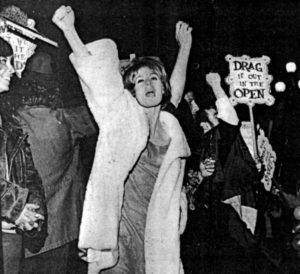Matthew 21:2-3
Go into the village ahead of you, and immediately you will find a donkey tied, and a colt with her; untie them and bring them to me. If anyone says anything to you, just say this, ‘The Lord needs them.’ And he will send them immediately.
This Sunday is Palm Sunday on our liturgical calendars. This is the day where we commemorate the protest march against the Empire that Jesus coordinated in Jerusalem just before he was executed. Much like the history of Pride, Palm Sunday has become tragically de-politicized. What began in both cases as radical resistance against unjust authority is now painted as something of a politely permitted parade. But without keeping in mind these revolutionary roots, we lose context for Palm Sunday and for our own LGBTQIA+ history.

There is a lot that goes into planning an action like Palm Sunday, a lot of roles to play, a lot of materials to gather. Jesus relied on the community to provide for the things that he would need. He trusted that the movement that was being built was wider and bigger than the people in his close personal circle. He knew that outside of the people he regularly interacted with, like his disciples and benefactors, there were people in the midst of their ordinary lives who were sympathetic and supportive of the cause in their own way. Jesus – who had a target on his back – would have had every reason to be skeptical about who he let be a part of his work. But instead of being suspicious of outsiders or acting as a gatekeeper, Jesus reached outside the scope of his normal relationships to invite people in.
LGBTQIA+ people have often had to learn to reach outside of our normal, socially mandated circles – like our family of origin, like traditional churches – to build chosen families and gather support. Many of us have been denied, betrayed, and wounded by our home churches or our families of origin. But out of this pain, new ways of being community have been formed. LGBTQIA+ people form networks of mutual aid to help one another in times of crisis or need, whether that is raising money for gender-affirming surgery or paying someone’s rent. When the ELCA did not ordain openly LGBTQIA+ leaders, we formed the extraordinary roster, outside of the normal, permissible way of doing things. And queer teenagers in isolated and queer-antagonistic regions reach out online to form friendships across the world that save lives.
Our status quo has been interrupted this year in the midst of a global pandemic. Our normal ways of forming community, extending support, and sharing resources have been stretched. But the world and the church have much to learn from LGBTQIA+ people. We have always been resilient and scrappy and creative in building unconventional relationships. We have often reached out, like Jesus, hoping that even if we didn’t quite know who it would be, that scattered amongst our neighborhoods and the internet, there are people there waiting and ready to provide for what we need.
Holy God, you sent your Begotten One, Jesus Christ to show us your radical way of Love and Liberation. We praise you for giving us the gift of unconventional relationships and creative community building. Thank you for the unknown helpers embedded in our networks. Empower us too to be ready to provide for our neighbors’ needs in times of uncertainty. Amen.
 Elle Dowd (she/her/hers) is a bi-furious seminarian at the Lutheran School of Theology at Chicago and a candidate for ordained ministry in the Evangelical Lutheran Church in America currently serving as the full-time pastoral intern at St. Luke’s Lutheran Church in Logan Square, Chicago. Elle has pieces of her heart in Sierra Leone, where her two children were born, and in St. Louis where she learned from the radical, queer, Black leadership during the Ferguson Uprising. She was formerly a co-conspirator with the movement to #decolonizeLutheranism and currently works as a community organizer with the Faith and Justice Collective and SOUL, writes regularly for the Disrupt Worship Project, and facilitates workshops on gender and sexuality and the Church in both secular conferences and Christian spaces. Elle has interests in queer and feminist Biblical interpretation and liberation and body theology. Elle loves spending time with the people she loves and on weekends, Elle tours the city of Chicago in search of the best brunch.
Elle Dowd (she/her/hers) is a bi-furious seminarian at the Lutheran School of Theology at Chicago and a candidate for ordained ministry in the Evangelical Lutheran Church in America currently serving as the full-time pastoral intern at St. Luke’s Lutheran Church in Logan Square, Chicago. Elle has pieces of her heart in Sierra Leone, where her two children were born, and in St. Louis where she learned from the radical, queer, Black leadership during the Ferguson Uprising. She was formerly a co-conspirator with the movement to #decolonizeLutheranism and currently works as a community organizer with the Faith and Justice Collective and SOUL, writes regularly for the Disrupt Worship Project, and facilitates workshops on gender and sexuality and the Church in both secular conferences and Christian spaces. Elle has interests in queer and feminist Biblical interpretation and liberation and body theology. Elle loves spending time with the people she loves and on weekends, Elle tours the city of Chicago in search of the best brunch.
Elle’s Twitter and Instagram handles are @HowNowBrownDowd and her public Facebook page is Facebook.com/ElleDowdMinistry

